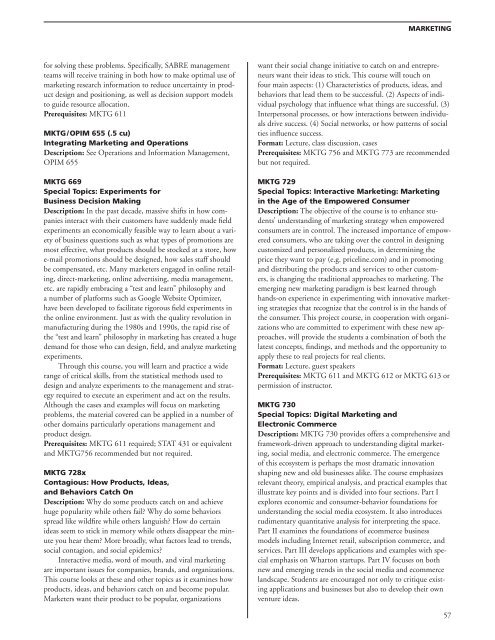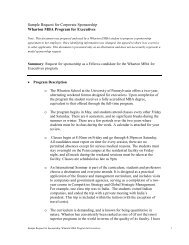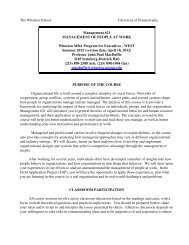Explore Options; Plan Your MBA Academic Program
Explore Options; Plan Your MBA Academic Program
Explore Options; Plan Your MBA Academic Program
Create successful ePaper yourself
Turn your PDF publications into a flip-book with our unique Google optimized e-Paper software.
for solving these problems. Specifically, SABRE management<br />
teams will receive training in both how to make optimal use of<br />
marketing research information to reduce uncertainty in product<br />
design and positioning, as well as decision support models<br />
to guide resource allocation.<br />
Prerequisites: MKTG 611<br />
MKTG / OPIM 655 (.5 cu)<br />
Integrating Marketing and Operations<br />
Description: See Operations and Information Management,<br />
OPIM 655<br />
MKTG 669<br />
Special Topics: Experiments for<br />
Business Decision Making<br />
Description: In the past decade, massive shifts in how companies<br />
interact with their customers have suddenly made field<br />
experiments an economically feasible way to learn about a variety<br />
of business questions such as what types of promotions are<br />
most effective, what products should be stocked at a store, how<br />
e-mail promotions should be designed, how sales staff should<br />
be compensated, etc. Many marketers engaged in online retailing,<br />
direct-marketing, online advertising, media management,<br />
etc. are rapidly embracing a “test and learn” philosophy and<br />
a number of platforms such as Google Website Optimizer,<br />
have been developed to facilitate rigorous field experiments in<br />
the online environment. Just as with the quality revolution in<br />
manufacturing during the 1980s and 1990s, the rapid rise of<br />
the “test and learn” philosophy in marketing has created a huge<br />
demand for those who can design, field, and analyze marketing<br />
experiments.<br />
Through this course, you will learn and practice a wide<br />
range of critical skills, from the statistical methods used to<br />
design and analyze experiments to the management and strategy<br />
required to execute an experiment and act on the results.<br />
Although the cases and examples will focus on marketing<br />
problems, the material covered can be applied in a number of<br />
other domains particularly operations management and<br />
product design.<br />
Prerequisites: MKTG 611 required; STAT 431 or equivalent<br />
and MKTG756 recommended but not required.<br />
MKTG 728x<br />
Contagious: How Products, Ideas,<br />
and Behaviors Catch On<br />
Description: Why do some products catch on and achieve<br />
huge popularity while others fail? Why do some behaviors<br />
spread like wildfire while others languish? How do certain<br />
ideas seem to stick in memory while others disappear the minute<br />
you hear them? More broadly, what factors lead to trends,<br />
social contagion, and social epidemics?<br />
Interactive media, word of mouth, and viral marketing<br />
are important issues for companies, brands, and organizations.<br />
This course looks at these and other topics as it examines how<br />
products, ideas, and behaviors catch on and become popular.<br />
Marketers want their product to be popular, organizations<br />
MARKETING<br />
want their social change initiative to catch on and entrepreneurs<br />
want their ideas to stick. This course will touch on<br />
four main aspects: (1) Characteristics of products, ideas, and<br />
behaviors that lead them to be successful. (2) Aspects of individual<br />
psychology that influence what things are successful. (3)<br />
Interpersonal processes, or how interactions between individuals<br />
drive success. (4) Social networks, or how patterns of social<br />
ties influence success.<br />
Format: Lecture, class discussion, cases<br />
Prerequisites: MKTG 756 and MKTG 773 are recommended<br />
but not required.<br />
MKTG 729<br />
Special Topics: Interactive Marketing: Marketing<br />
in the Age of the Empowered Consumer<br />
Description: The objective of the course is to enhance students’<br />
understanding of marketing strategy when empowered<br />
consumers are in control. The increased importance of empowered<br />
consumers, who are taking over the control in designing<br />
customized and personalized products, in determining the<br />
price they want to pay (e.g. priceline.com) and in promoting<br />
and distributing the products and services to other customers,<br />
is changing the traditional approaches to marketing. The<br />
emerging new marketing paradigm is best learned through<br />
hands-on experience in experimenting with innovative marketing<br />
strategies that recognize that the control is in the hands of<br />
the consumer. This project course, in cooperation with organizations<br />
who are committed to experiment with these new approaches,<br />
will provide the students a combination of both the<br />
latest concepts, findings, and methods and the opportunity to<br />
apply these to real projects for real clients.<br />
Format: Lecture, guest speakers<br />
Prerequisites: MKTG 611 and MKTG 612 or MKTG 613 or<br />
permission of instructor.<br />
MKTG 730<br />
Special Topics: Digital Marketing and<br />
Electronic Commerce<br />
Description: MKTG 730 provides offers a comprehensive and<br />
framework-driven approach to understanding digital marketing,<br />
social media, and electronic commerce. The emergence<br />
of this ecosystem is perhaps the most dramatic innovation<br />
shaping new and old businesses alike. The course emphasizes<br />
relevant theory, empirical analysis, and practical examples that<br />
illustrate key points and is divided into four sections. Part I<br />
explores economic and consumer-behavior foundations for<br />
understanding the social media ecosystem. It also introduces<br />
rudimentary quantitative analysis for interpreting the space.<br />
Part II examines the foundations of ecommerce business<br />
models including Internet retail, subscription commerce, and<br />
services. Part III develops applications and examples with special<br />
emphasis on Wharton startups. Part IV focuses on both<br />
new and emerging trends in the social media and ecommerce<br />
landscape. Students are encouraged not only to critique existing<br />
applications and businesses but also to develop their own<br />
venture ideas.<br />
57

















